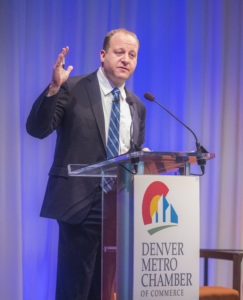Denver Metro Chamber of Commerce Hosts 2021 State of the State Presented by Xcel Energy
Virtual Event Featured Remarks from Gov. Jared Polis, Commentary from the Chamber’s Kelly Brough and a Panel of Business Leaders for a Discussion on Economic Development and Policy
DENVER – Today, the Denver Metro Chamber of Commerce gathered to reflect on an historic legislative session that saw leaders tackle issues from health care to transportation. The annual event – regularly attended by elected officials and business leaders – highlighted the many ways business engaged in Colorado policy during the 2021 legislative session. Gov. Jared Polis also shared his thoughts on the session, which concluded last week.
Gov. Polis focused on some bright spots of the legislative session such as stimulus relief for small businesses and transportation. He noted the business community’s partnership as a key factor for the state’s focus on economic recovery following the pandemic.
“We are also prioritizing Colorado’s future by leaving our state’s budget in the healthiest state it’s ever been,” said Gov. Polis. “We’re prepared to weather whatever storms might be headed our way through thoughtful input and partnership with the business community.”
At her last State of the State as President and CEO of the Denver Metro Chamber of Commerce, Kelly Brough contrasted the remarks of Gov. Polis with a reminder of the need for collaboration and stakeholder engagement to craft good policy, and the ways in which legislators failed to work alongside the business community to achieve the goals that all Coloradans share for the state.
“We can’t say it enough. We need policy that recognizes it takes all of us to be successful. That the health of our state budget, our nonprofits and our public sector depend on a thriving private sector,” said Brough. “Just as the private sector relies on strong education, transportation, health care and the support of a nonprofit ecosystem to be successful. It takes us all.”
Brough highlighted examples of collaboration on issues of data privacy and transportation but overall emphasized the need for more stakeholder engagement on issues that impact all Coloradans. This engagement is particularly important when it comes to understanding the long-term consequences of policy on different sectors or communities. Brough warned of the pitfalls that exist when one party is in control at the Capitol. Read Brough’s full remarks.
Business leaders echoed Brough’s focus on the need for more interaction between business leaders and elected officials earlier in the legislative process. J. J. Ament, CEO of the Metro Denver Economic Development Corporation, moderated a discussion between Carla Dore, president, Workplace Resource, Helen Drexler, president & chief executive officer, Delta Dental, Mowa Haile, president, Sky Blue Builders, LLC, and Alice Jackson, president, Xcel Energy.
“Colorado’s sun isn’t necessarily shining everywhere,” remarked Ament. “We’re increasingly hearing from executives and site selectors that they are concerned with where Colorado is headed when it comes to policy – that the cost and regulatory burden of doing business in our state is going up.”
Dore and Haile spoke to challenges that the small business community has experienced due to recent legislation, and how they prepare for the impact of these changes as business owners. Drexler and Jackson added the perspective of large employers in the state and discussed the challenges they – and their employees – have faced over the past year.
All of today’s speakers touched on the fact that Colorado is a great place to live – and should remain a great place to do business for both employers and employees – as the legislature continues to tackle tough issues that impact organizations from all sectors and Coloradans across the state. In addition to Xcel Energy, today’s event was also sponsored by Southwest Airlines and Delta Dental.
View a recording of today’s event.
About the Denver Metro Chamber of Commerce: For 153 years, the Denver Metro Chamber of Commerce has been a leading voice for Colorado’s business community. With a membership that spans the state and includes 3,000 businesses and their 400,000 employees, the Chamber is an effective advocate for small and large businesses. The Chamber’s family of organizations includes the Metro Denver Economic Development Corporation, the Denver Metro Chamber Leadership Foundation, the Denver Metro Small Business Development Center, the Colorado Competitive Council, B:CIVIC, Prosper Colorado and the Denver Opportunity Youth Initiative. For more information, go to denverchamber.org.
# # #
The 2020 session at Denver Metro Chamber State of the State.
A legislative session that began with several costly proposals later dropped, such as state-run paid family leave and a state health insurance option, ended with a battle over bills that added additional burdens and costs to business, such as unemployment insurance and roll-backs to tax relief, Kelly Brough, president and CEO of the Denver Metro Chamber of Commerce, told more than 700 attendees at the Chamber’s 14th annual State of the State on Monday.
Colorado Gov. Jared Polis, as well as Joint Budget Committee (JBC) Vice Chair Sen. Dominick Moreno (D-Commerce City), JBC Member Sen. Bob Rankin (R-Carbondale) and Chamber Board Chair David Eves, also spoke at the virtual event.
“Unfortunately, what we were told would be a fast, free and friendly second half of the session turned into a battle over costly proposals for employers,” Brough said during her remarks. “For every encouraging piece of legislation, there were three or four bills that added additional burdens and costs to business. In a different economy or in isolation, we’d be disappointed by each one of these bills, but in this environment these types of bills reduce confidence and create uncertainty, slow potential hiring and hurt our economic recovery.”
The business community was able to negotiate for amendments that lessened the blow for several bills, including a sick leave for employers (Senate Bill 205), increases to unemployment insurance contributions (Senate Bill 207), increased fees to fund the state’s reinsurance program and other health care-related expenses (Senate Bill 215), whistleblower rules (House Bill 1415) and a tax bill that would have rolled back relief for most businesses (House Bill 1420). A bill related to essential workers that the business community opposed was postponed indefinitely (Senate Bill 216).
In his remarks, Gov. Polis mostly shared his appreciation for businesses’ efforts to stop the spread of COVID-19 by requiring facemasks and practicing social distancing.
“We know that there are tough days behind us and tough days ahead,” he said. “We’ve always come out the other side stronger.”
He also voiced his support for two issues headed to November’s ballot – one that would repeal the Gallagher Amendment to bring commercial and property taxes in line and one to increase taxes on nicotine and vaping products to fund health care and education.
Moreno also said the Gallagher Amendment would help the JBC in its long-time struggle to fund education.
“It’s the Gallagher Amendment that’s required more and more education funding to come from the state’s budget,” Moreno said. “Two-thirds of funding for K-12 comes from the state budget, because the Gallagher Amendment has forced down property assessment rates for years.”
Gov. Polis signed the state’s budget Monday morning before the event. Moreno and Rankin were among the JBC members who had to work together to build a balanced budget while facing a $3.4 billion budget shortfall. The JBC worked for three weeks through over 350 decision items to completely rethink the budget. The final budget reflected cuts including $557 million to K-12 schools, $492 million to higher education, and the suspension of $225 million in a direct distribution payment to the Colorado Public Employees’ Retirement Association. Some of those cuts were offset in part by the $1.67 billion that Colorado received from the federal CARES Act to fund items like public health and education.
The budget process reminded us how economics works, Brough said. “A downturn in the private sector impacts the public sector – fewer people paying income tax, fewer companies paying income taxes, fewer people and companies buying goods – all reduces revenues to local governments,” she said. “Our focus during this time is how to keep our employers viable and their employees on payroll, which in turn reduces the negative financial impact on the public sector.”
Rankin said his focus while working with other JBC members was to get people back to work. “From the business community’s perspective, recovery is to me is more important than finding ways to tax ourselves out of this situation,” he said.
Even though the session led to conflicts between some lawmakers and the business community, both Brough and Eves shared their appreciation to Speaker of the House K.C. Becker (D-Boulder) and other legislators for their leadership this year.
“These past few months have been so challenging in so many ways and your commitment to your communities and to Colorado does not go unnoticed and we’re grateful to you,” Eves said.
Premier Sponsors of State of the State were Alpine Bank, BOK Financial, Brownstein Hyatt Farber Schreck LLP, CBRE, Centura Health, CenturyLink, Checkr, Denver Water, Dynalectric Company, HealthONE, Husch Blackwell, Land Title Grand Company, NREL, OfficeScapes, Plante Moran, PNC Bank, RK Saunders Construction, Suncor, Transamerica, United Airlines, US Bank, Wells Fargo and Xcel Energy.
Read the Chamber’s positions on various bills from the 2020 Legislative Session.
Denver Metro Chamber of Commerce President and CEO Kelly Brough expressed disappointment with the process for engaging in policy debate during the just-concluded legislative session – for the business community and many others who worked to have their voice heard on issues ranging from oil and gas regulations to family leave time.
“When a process is used to reduce a group’s ability to engage … I think that’s destructive; I think it diminishes trust instead of building trust,” Brough said at State of the State on Friday, a week following the close of the session.
During the session, the Chamber and its members fought to address policy like Senate Bill 188, FAMLI leave, which would have created a state-run family leave program funded by a $1-2 billion payroll tax on employees and employers. There was no guarantee that the program would be actuarially sound, raising alarms for the business community. While the Chamber supports family leave, its concern was that the program was not actuarially studied to ensure funding would be there when people need it most. After concerns were raised by many in the business community, the legislation was amended to a study on such a program.

“I’m very proud to represent a business community that said it’s not just about us, it’s about our workers and the other sectors as much as it is about employers,” Brough said during a conversation with Gov. Jared Polis moderated by Kent Thiry – outgoing CEO of DaVita, which was the presenting sponsor of the event.
Polis agreed that more information on the impacts of such a program are needed: “I was very happy that the outcome allows the time and space to get something of that magnitude right,” he said.
Brough noted that the off-season would be spent working with legislators to build stronger partnerships with legislators.
Despite the challenges, there were wins for the business community in education. The Chamber supported several bills to expand educational attainment opportunities, from a pilot program to allow schools to create innovative learning plans that include more hands-on experiences, to making concurrent enrollment classes transferable at Colorado colleges and universities and offering credit for competencies gained from work-based learning.
But, the challenges remain in a state where 74 percent of the workforce needs a post-secondary credential – the highest education needs in the country. “We’re nowhere near where we should be,” Brough said. “We have to figure out how we close the gap because the pipeline is leaking right now.”
Governor shares reflections of first session

Polis shared his perspective on his first 120-day session with the audience of more than 700 metro area business leaders, noting, “We wasted no time in getting to work.”
He touted the passage of full-day kindergarten, which will start this fall; support for technology like blockchain in surprising industries such as agriculture; and the ballot referral of a question to voters to keep revenue in excess of the constitutional limitations of TABOR (the Taxpayer Bill of Rights). He also praised recent announcements of new jobs coming to the state from Checkr and Amazon.
“Come invest in Colorado!” Polis said.
Chamber turns attention towards ballot
Brough shared the Chamber’s support the TABOR De-Brucing ballot measure and expressed support for finding new streams of revenue to help fund the state’s water plan.
She also shared concerns about a measure in Lakewood that would cap growth in the city.
“Whether you are concerned about water, transportation, air quality or affordable housing, not allowing our state and our region to develop more densely is about the worst possible strategy we could employ,” Brough said.
Bill Lindsay Named Robert Blankenship Heart Award Honoree

Lindsay was recognized with the award, named in memory of Blankenship, the former chief operating officer of the Chamber and a steward of the business community.
Lindsay, principal of Lindsay3, has offered his time as a chair of the Chamber’s board of directors and has provided expertise and advocacy for small business and in navigating health care issues. Although Lindsay was unable to attend the event and accept the award in person, Children’s Hospital Colorado CEO Jena Hausmann read remarks on his behalf.
“I am especially honored and humbled to receive the Robert Blankenship Hear Award,” Hausmann read. “He was both my friend and my mentor, and thus to be the recipient of an award with his name on it is one of the most meaningful honors.”
The Session is in Full Swing
The session kicked off on Jan. 4 and already, just two weeks in, 86 bills have been introduced in the Senate and 124 bills have been introduced in the House. The General Assembly is fully controlled by the Democratic party this year with 19 of the 35 Senators and 41 of the 65 Representatives representing the party. As always, the Chamber is here to keep you up to speed on legislation that can impact your business. Stay in touch with us by checking our website and sharing with us your concerns as the session progresses.
Legislative Leadership Meets with Chamber Board Members
As in previous sessions, leaders of both the House and Senate met with the Chamber board of directors recently to discuss legislative priorities for the 2019 legislative session. House Speaker KC Becker, Assistant Senate Minority Leader John Cooke, Senate President Leroy Garcia and Assistant House Minority Leader Kevin Van Winkle each outlined their priorities for the session and fielded questions from board members.
Chamber President and CEO Kelly Brough took the opportunity to stress the importance of adequate funding of our P-20 education system as well as transportation following the failure of business-backed Proposition 110. She relayed fears that with its failure, transportation infrastructure upgrades will only happen in certain parts of the state, leaving behind rural or less prosperous areas.
Board members appreciated the opportunity to represent member concerns as we kick off this critical session. Before the start of the session, Kelly Brough sent this letter to each legislator, outlining the Chamber’s priorities and how we work.
Governor Polis’ First State of the State Address
Last Thursday Gov. Jared Polis gave his first State of the State address to the Colorado General Assembly, outlining his key priorities for the session – including education, health care, renewable energy and tax reform. The Chamber was encouraged to see that some of the governor’s priorities line up with the Chamber’s pillars. We know our pillars are the keys to our economic future. In order for our community to succeed, we must have:
Gov. Polis mentioned specifically his goal to fund full-day kindergarten. The Chamber has long supported funding early childhood education because research shows a clear return on investment. However, the Chamber also recognizes the number of challenges Colorado’s P-20 educational pipeline faces, including the reality that college is becoming more unattainable for Colorado families (Colorado funds higher education 48th out of 50 states) and that more than half of our school districts in the state have moved to a four-day school week because many of them can’t afford to run their buses on the fifth day.
Further, members of the Chamber recognize the critical needs of Colorado’s transportation system and that the lack of investment in our roads and bridges is affecting our quality of life and passing significant costs onto every driver and fleet in our state. As with all funding proposals, the Chamber will monitor the Joint Budget Committee’s proposed allocation of resources closely in the next few months and continue to advocate for funding for our educational and transportation systems that provide the greatest return on our investment.
Gov. Polis also promised to focus on addressing the rising costs of health care in our state. Chamber members have continuously identified this issue as one of the most pressing businesses face, and the Chamber has spent the last year working with more than 35 health care organizations to identify industry-wide strategies that address Colorado’s rising health care costs. The summary report of the groups findings will be released soon. Read Polis' remarks.
New Policy Positions. The Chamber weighed in on 10 bills this week.
The Chamber supports:
The Chamber opposes:
The Chamber is neutral on: